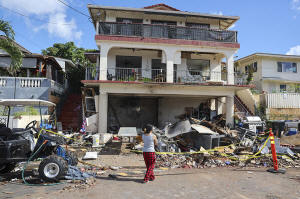Will a devastating New Year's Eve explosion change Hawaii's fireworks
culture?
 Send a link to a friend
Send a link to a friend
 [January 03, 2025]
By AUDREY McAVOY, JENNIFER SINCO KELLEHER and GENE JOHNSON [January 03, 2025]
By AUDREY McAVOY, JENNIFER SINCO KELLEHER and GENE JOHNSON
HONOLULU (AP) — In recent years, occasions large and small — parties,
Super Bowls, mixed-martial arts fights, even Thanksgiving — have
provided a reason for residents across Hawaii to set off illegal
fireworks.
The increasingly sophisticated displays, loved by some and loathed by
others, are so prevalent that some people consider them part of the
state's culture. They have rattled neighborhoods of tightly packed
houses, started fires, terrorized pets and knocked a light fixture off
the ceiling of an Associated Press reporter’s home, where it narrowly
missed a child and shattered on the floor.
Each New Year's Day, Honolulu officials publish a list of fireworks
casualties from the night before, typically a litany of burns, shrapnel
wounds or amputations. Sometimes there are deaths.
But none of the damage has matched Tuesday night's tragedy, when a lit
bundle of mortar-style aerials tipped over and shot into crates of unlit
fireworks, causing a rapid-fire series of blasts that killed three women
and injured more than 20 people, including children. Another person was
killed in an unrelated fireworks explosion on Oahu.
Authorities and residents alike are now wondering whether the toll will
dissuade people from putting on such shows in the future, or whether it
will prompt more effective efforts by police to crack down.

“This incident is a painful reminder of the danger posed by illegal
fireworks,” Honolulu Mayor Rick Blangiardi told a news conference. “They
put lives at risk, they drain our first responders and they disrupt our
neighborhoods.”
Efforts to crack down on contraband fireworks have had limited effect.
In 2023, lawmakers created an illegal fireworks task force. Based on the
ease with which it seized fireworks, including three shipping containers
in its first few months in operation, the state Department of Law
Enforcement concluded illegal fireworks are likely smuggled into Hawaii
on a daily basis.
The task force has seized 227,000 pounds (about 103,000 kilograms) of
fireworks in all, according to Gov. Josh Green.
And yet, the Honolulu Fire Department reported Thursday that there were
30 fireworks-related blazes between Tuesday and Wednesday, a 30%
increase from last New Year's celebrations.
Rep. Gregg Takayama, who sponsored legislation passed last year to
tighten fireworks controls, said he remembers setting them off when he
was younger and agrees it’s a tradition for many. But the ones he played
with, including Roman candles, pale in comparison to those on the black
market today.
“The kind of aerial fireworks that are being used now are really
explosive bombs,” he said. “And so the danger is magnified.”
Charmaine Doran, the vice-chair of the neighborhood board in Pearl City,
northwest of Honolulu, called the notion that fireworks are part of
Hawaii culture a misconception: “They have been outlawed for all of my
life ... and I’m pretty old.”
In her neighborhood, the fireworks ramp up after Halloween, exploding in
the middle of the night until New Year’s. Doran said she can tell if
there is a big mixed martial arts fight on TV because the booms begin
earlier in the day.

[to top of second column]
|

A woman stands in front of the home where a New Year's Eve fireworks
explosion killed and injured people, Wednesday, Jan. 1, 2025, in
Honolulu. (AP Photo/Marco Garcia)

Enforcement is complicated because people are reluctant to report
their neighbors on a small island where “we’re related to everybody,
everybody knows everybody,” Doran said.
People fear retribution, she added: “If I dial 911, they’re going to
egg my house.”
That was the theme of some testimony to the Legislature last
January. Beverly Takushi, a Pearl City resident, described once
being threated by a neighbor when she told his brother to stop
launching illegal fireworks in a show that lasted from 5:30 p.m. on
New Year’s Eve until after midnight.
“It was the first time I was threatened not only by the danger of
the aerial fireworks to my family and property, but also for my
safety from this neighbor who accused me of not respecting his
culture,” Takushi said. “He has since apologized, but this is the
reason why no one wants to get involved and report their neighbors
setting off bombs and aerials.”
Many historians believe fireworks were invented in China more than
2,000 years ago and their use came to signify joy and prosperity, as
well as warding off evil. In Hawaii they are celebrated not just by
residents of Chinese descent but all across the state's diverse
communities.
Takushi echoed Takayama's point about the big difference between
today's large, professional-grade fireworks and the smaller ones of
yesteryear.
“A string of firecrackers at midnight to ward off bad spirits is
cultural, not loud explosives that sound like you are in the middle
of a war," Takushi said.
Richard Oshiro, secretary of the neighborhood board for Waipahu,
known as one of Oahu’s hotspots for aerial displays, said he hopes
this week's deaths will spur a change of mentality about playing
with explosives.
He said he tries to report them whenever he can, even though he
knows there is not much police can do if “they can’t catch people in
the act.”
Possession of over 50 pounds (about 23 kilograms) of aerial or other
illegal fireworks in Hawaii is a felony punishable by up to five
years in prison and a $10,000 fine. Takayama noted the law now
allows photographs and videos of fireworks to be submitted as
evidence in court, but said prosecutions still face hurdles.

“We already have laws on the books. We need to find better ways to
enforce them,” he said. "I mean we constantly hear about people who
report on their neighbors using illegal aerials, but nothing is done
about it.”
The best way to control fireworks is to stop them at Hawaii’s ports,
Takayama said. Law enforcement has intelligence about which
shipments contain illegal fireworks and U.S. authorities have the
power to open suspicious cargo. The task force has made seizures but
needs to do more, he said.
“We need to find ways to restrict the amount of fireworks that are
coming in, because once they arrive and once they’re in the
community, it’s very difficult to track them down,” Takayama said.
All contents © copyright 2024 Associated Press. All rights reserved |